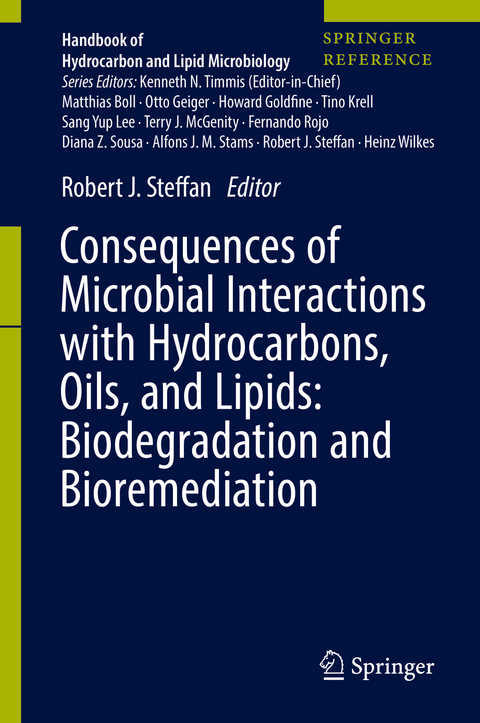
Consequences of Microbial Interactions with Hydrocarbons, Oils, and Lipids: Biodegradation and Bioremediation
Springer International Publishing (Verlag)
978-3-319-50432-2 (ISBN)
Dr. Robert Steffan worked in the environmental industry for more than 25 years, and most recently served as the director of CB&I Federal Services, LLC’s Biotechnology Development and Application Group. His primary research interests were biodegradation of ether containing pollutants (1,4-dioxane, MTBE, BCEE, etc.) and chlorinated solvents, bioaugmentation for remediation, development of novel remediation strategies, molecular biology of degradative bacteria, and development and application of genetic probes, biocatalysis and biosensors. He received his Ph.D. in biology in 1988 from the University of Louisville where he worked on the development of molecular biological tools for monitoring genetically engineered microorganisms in the environment. His work included the first ever application of the polymerase chain reaction (PCR) for monitoring organisms in environmental samples. This early work provided a basis for much of the PCR-based environmental analysis in use today. In 1988, Dr. Steffan received an Alexander von Humboldt fellowship to perform post-doctoral research at the National Institute for Biotechnology in Braunschweig, Germany. There, he worked to identify and genetically engineer degradative pathways in bacteria and to evaluate genetic transformation of bacteria in nature. He has authored more than 85 scientific papers including two invited review articles in the Annual Review of Microbiology, and has received 11 patents. He has served as a member of the editorial board of the Journal of Bacteriology and Applied and Environmental Microbiology, has served on several scientific review panels, and was the recipient of the 2008 Excellence in Review Award from Environmental Science & Technology. He also obtained a Juris Doctorate degree from Temple University and was licensed to practice law in states of New Jersey and Pennsylvania
Biodegradation and Bioremediation: An Introduction;- Developing Bioremediation Technologies for Commercial Application: An Insiders View;- Utility of Industrial Experimental Sites for Developing Analytical, Monitoring, and Remediation Technologies;- Bioremediation of Marine Oil Spills;- Oil Biodegradation in Deep Marine Basins;- Biostimulation Strategies for Enhanced Bioremediation of Marine Oil Spills Including Chronic Pollution;- Weathered Hydrocarbon Biotransformation: Implications for Bioremediation, Analysis, and Risk Assessment;- Role of Biosurfactants;- Plant-Endophyte Partnerships to Assist Petroleum Hydrocarbon Remediation;- Removal of Hydrocarbons and Other Related Chemicals Via the Rhizosphere of Plants;- Natural Attenuation of Hydrocarbon Compounds in Groundwater;- In Situ: Groundwater Bioremediation;- Microbiology of Oil- and Natural Gas-Producing Shale Formations: An Overview;- Cometabolic Bioremediation;- Anaerobic Biodegradation of Hydrocarbons: Metagenomics and Metabolomics;- Genomic Response of Pseudomonas putida to Toluene;- Biodegradation of Ether Pollutants;- Plastic Biodegradation: Challenges and Opportunities;- Determination of Kinetic Parameters and Metabolic Modes Using the Chemostat;-
| Erscheinungsdatum | 24.08.2019 |
|---|---|
| Reihe/Serie | Handbook of Hydrocarbon and Lipid Microbiology |
| Zusatzinfo | XVIII, 414 p. 50 illus., 30 illus. in color. |
| Verlagsort | Cham |
| Sprache | englisch |
| Maße | 155 x 235 mm |
| Themenwelt | Naturwissenschaften ► Biologie ► Mikrobiologie / Immunologie |
| Schlagworte | applied microbiology • biochemistry • Biochemistry, general • biodegradation • Biomedical and Life Sciences • bioremediation • Biotechnology • crude oil • Ecological science, the Biosphere • Environmental Engineering/Biotechnology • Environmental science, engineering and technology • groundwater • Hydrocarbon Pollution • Industrial • Kohlenwasserstoffe • Life sciences: general issues • microbial ecology • Microbiology (non-medical) • Shale oil • Umweltverschmutzung |
| ISBN-10 | 3-319-50432-0 / 3319504320 |
| ISBN-13 | 978-3-319-50432-2 / 9783319504322 |
| Zustand | Neuware |
| Haben Sie eine Frage zum Produkt? |
aus dem Bereich


